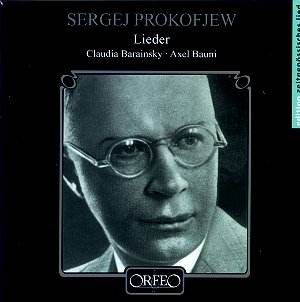The resurgence of interest in the byways of Sergei
Prokofiev’s output on the fiftieth anniversary of his death has
been most welcome, whether the fruits be in the concert hall or
in the record shop. In 2001, Delos issued a three-disc ‘complete’
edition of Prokofiev’s songs (DE3275 review),
which remains an invaluable, if somewhat artistically lumpy, document.
Orfeo, as part of their innovative ‘Edition zeitgenössiches
Lied’ series, provide the perfect partner to the Delos.
Claudia Barainsky has a wide repertoire that
includes works by Nono, Reimann, Zemlinsky and Berg (this year
she adds Bernd Alois Zimmermann to the list, taking on Marie in
Die Soldaten in Amsterdam). Hardly surprising that she
feels at home here in Prokofiev, therefore. She also has the advantage
of the ever-sensitive Axel Bauni to back her up. Bauni’s insights
into the accompaniments are a consistent delight of this disc.
A good idea to begin with the Op. 36 Bal’mont
settings, so that the Ugly Duckling comes cocooned within
the Prokofievian sound-world rather than slightly set-off. The
piano accompaniment to the first song is archetypal Prokofiev,
the harmonies characteristically peppered (for the spiky, playful
side of this composer, try the third song). The fifth song emerges
as the finest of the set, with its bleak harmonies and dream-like
vocal line. Barainsky and Bauni seem as one in their interpretation,
making for mesmerizing listening.
The Songs without Words of 1915 are simply
beautiful, and it is difficult to imagine a more convincing performance
than here. Barainsky possesses a voice that can convey the disembodied,
floating aura of the first two songs to perfection, and Bauni
spins the accompanimental web of the third magically. But it is
the Akhmatova settings of Op. 27 (1916) that seem to me to represent
Prokofiev the song-writer at his finest. Bauni is superb in the
active piano part of the first; both performers realize the desolation
of the third and the bare, stark gestures of the fourth with great
impact. Only in the second setting could Barainsky’s vocal line,
perhaps, been even cleaner. The texts, which deal with a disintegrating
relationship, must surely touch the most granite of hearts.
The beauty of the Op. 23 songs comes across strongly
here (the purity of Barainsky’s higher register is particularly
worthy of note), as do some of Prokofiev’s ‘quirks’ (try the ‘slip
and slidy’ piano part of No. 2). Apt, though, that this recital
closes with the Op. 73 Romances, written at the time of
the composer’s return to the Soviet Union after his sojourn in
Paris. Op. 73 formed part of the Pushkin celebrations (on the
centenary of the poet’s death). Although the shortest set on the
disc (and the only one to come in at less than ten minutes), this
brevity suits the concentration of expression.
Barainsky and Bauni, in final analysis, do get
closer to the heart of Prokofiev than their Delos rivals. All
the more unfortunate, then, that there are no Russian texts, transliterated
or otherwise (translations are taken from Delos, Chandos and Hyperion).
Colin Clarke
